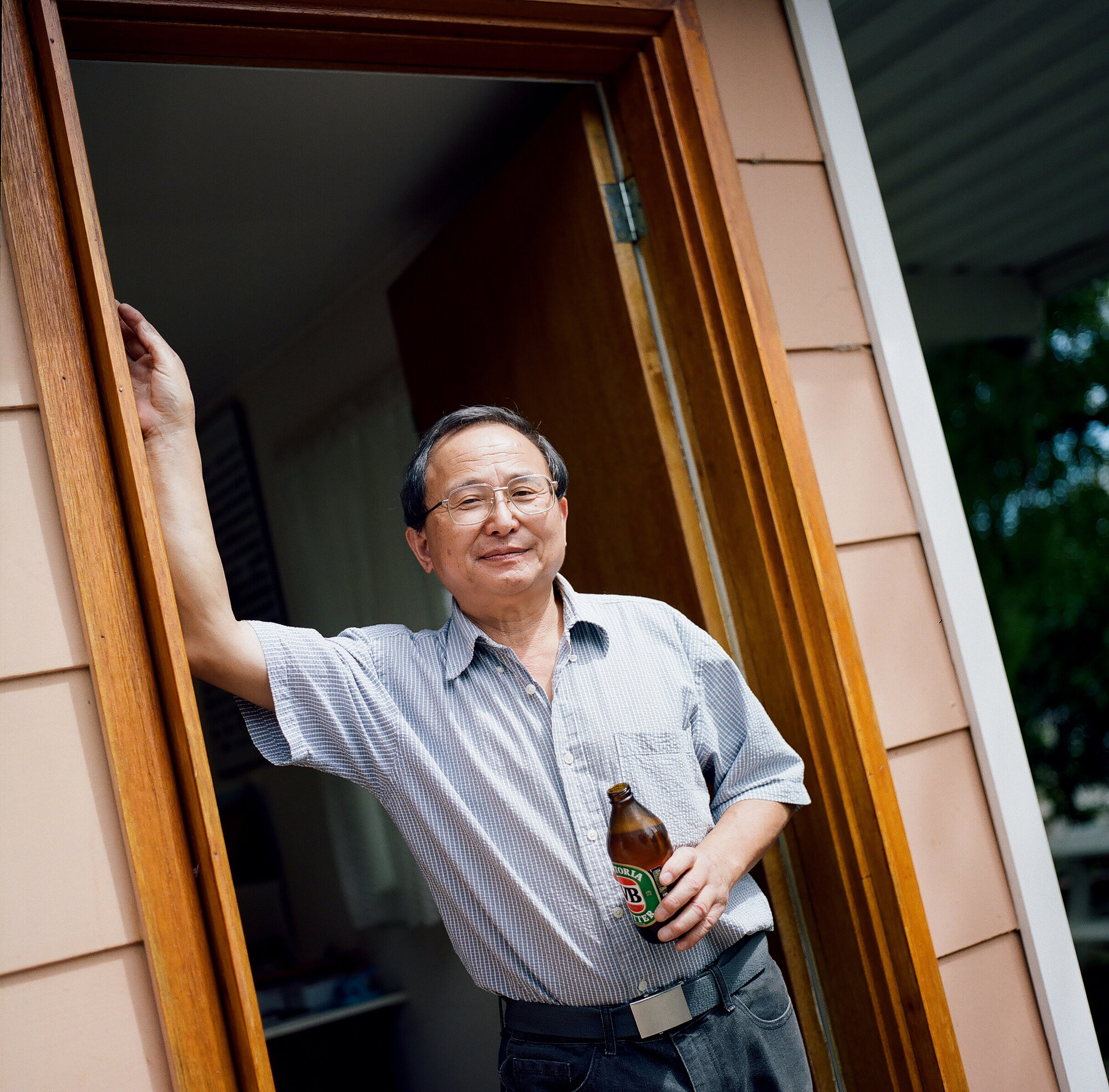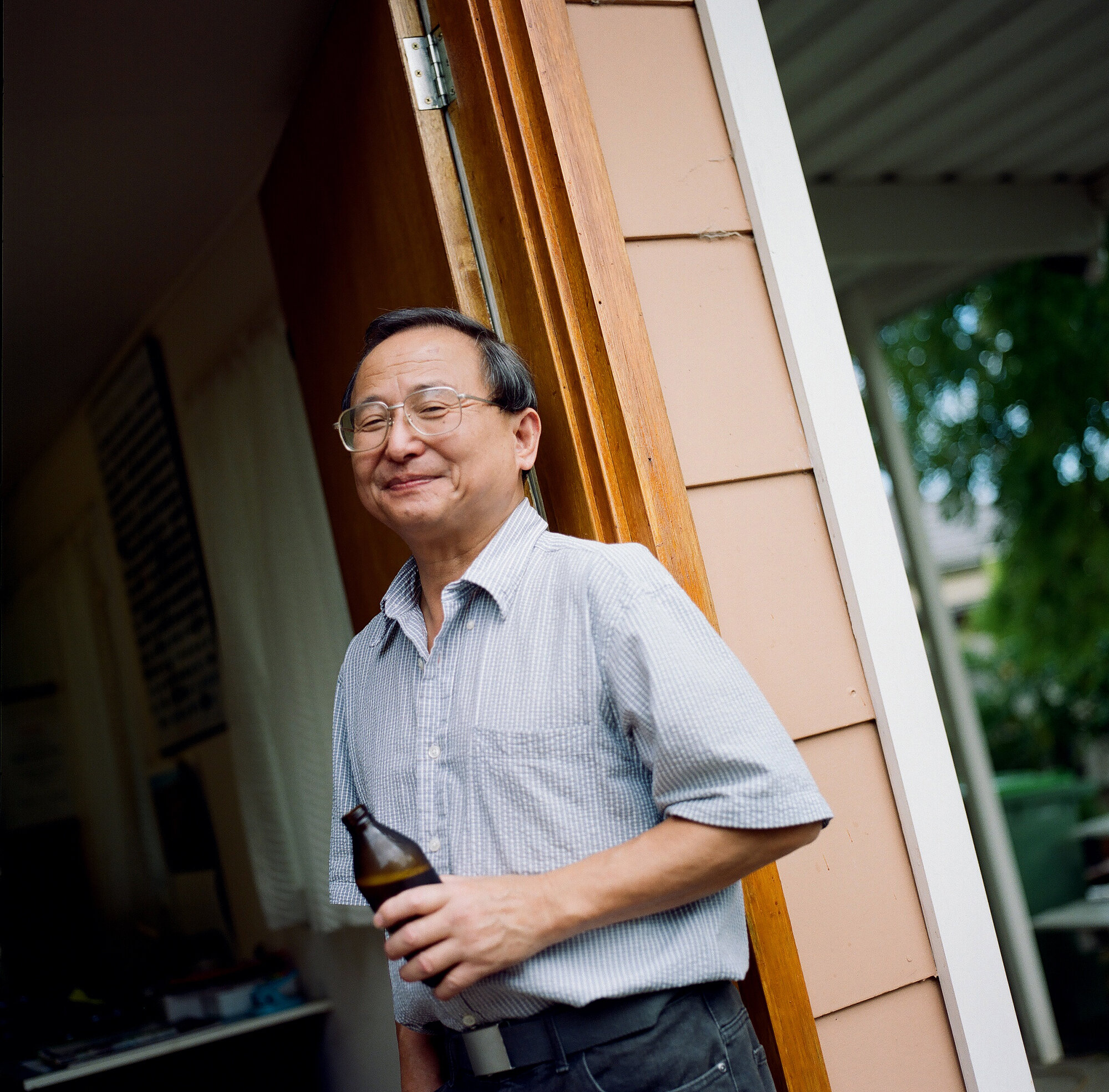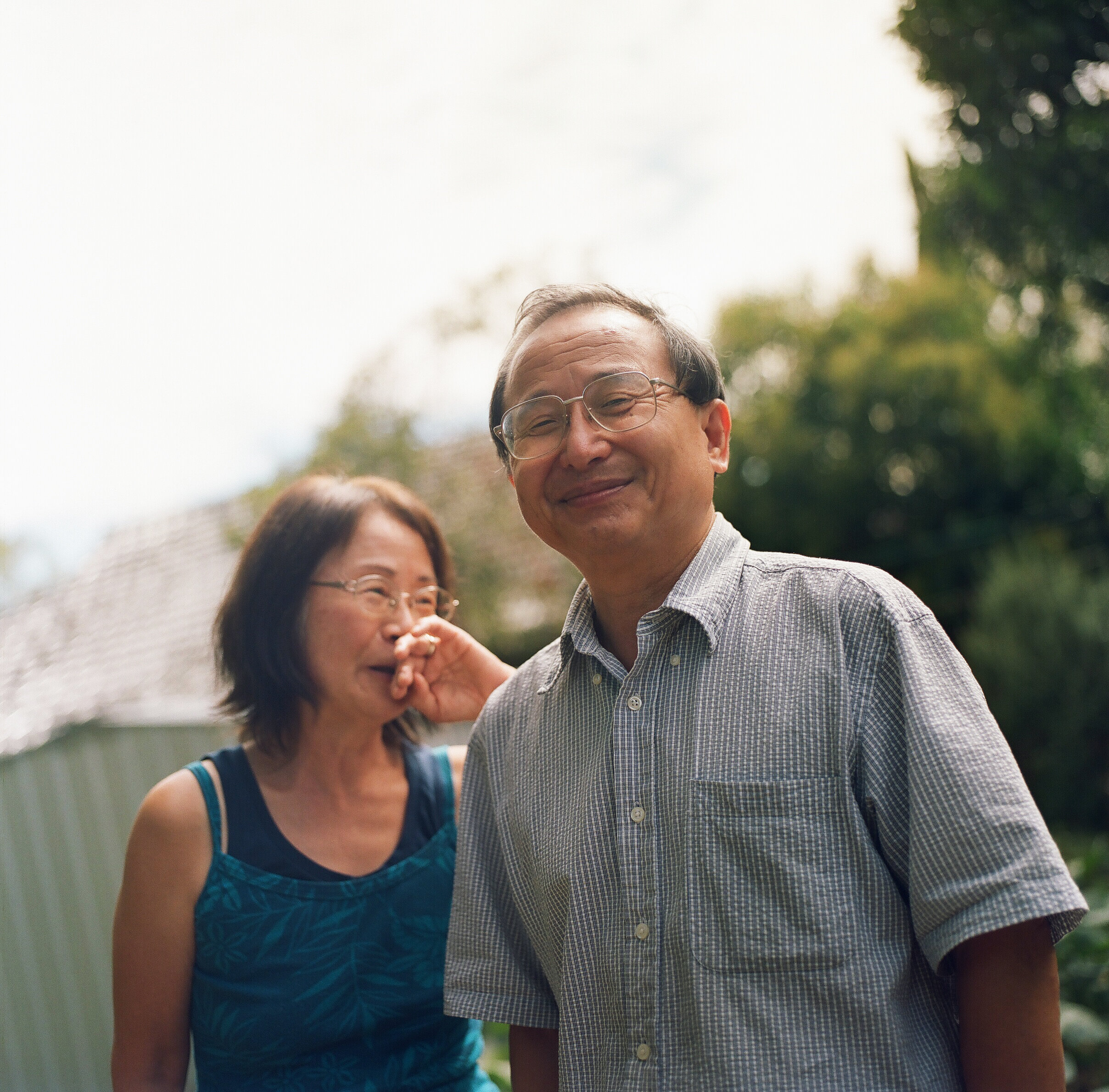Interview #141 - Hiroyoshi Nagami / 永見博義さんとのインタビュー
by Leah Jing McIntosh
Hiroyoshi Nagami is perhaps the best camera repairman in Australia, though I’m a little biased—early on, during the first year of LIMINAL, he fixed my Hasselblad. I was enamoured with Yoshi’s kindness, his charm, and his incredible attention to detail.
I met Yoshi at his home studio back in 2019 and, after lunch, we had a beer and he spoke to me about repairing cameras, living under the southern stars, and what it means to be a good citizen.
The interview questions were received in English, and answered in Japanese.
This interview has been kindly translated, pro bono, by Jason Beckman, one of the very first supporters of Liminal.
We hope it is the first of many translated interviews.
What made you decide to become a camera specialist?
After traveling Australia, New Zealand, and South America for about two years I returned home to Japan in 1976, when I was 27, and was hired by an 8mm camera manufacturer as a repairman, then after I learned basic repair techniques for half a year I went to Belgium.
At university I studied optical engineering, but I wasn’t particularly interested in camera repair. It’s just that the company that happened to allow me to go abroad was a camera company.
But then, during the two years I was in Belgium that company went bankrupt, and from there all kinds of drama began in our lives.
It was probably because—even if the type of camera is the same and the problem is the same, the cause might be different, and it’s fun to solve it.
It’s a plus that even with a small body, I can do work indoors with just my knowledge and experience.
And also because—when I see how happy the customer is when I’m able to somehow fix a difficult camera, I feel even more happy. Now, people who have grown tired of digital cameras have become interested in old film cameras and enjoy repairing them, and I’ve challenged myself with cameras from all over Australia that I’ve never repaired before—it’s tiring but there’s an aspect of fun to it.
オーストラリア、ニュージーランド、そして南アメリカと合計2年余の旅行から日本に帰った1976年27歳の時に東京にあった8㎜カメラ製造会社に修理人として雇われ、半年間基礎的な修理を習った後ベルギーに行きました。
大学では光工学を学んでいましたが特にカメラ修理には興味はありませんでした。
海外に行かせてくれる会社がたまたまカメラの会社だったというだけの事です。
しかしその会社はベルギーにいる間の2年の内に倒産をしてしまい、そこからいろいろな私たちの人生のドラマが始まりました。
同機種のカメラで同じトラブルなのにその原因が違うこともあり、その謎解きが楽しいのかも。
小さな身体でも知識と経験だけで室内で仕事ができるのが利点です。
そして難しいカメラでも何とか直してお客が喜んでくれるのを見た時さらに喜びを感じるからでしょう。デジタルカメラに飽きてきた人たちが今では古いフィルムカメラを面白がって修理を頼むようになり、オーストラリア中からこれまで修理をしたこともないカメラにチャレンジするのも疲れますが楽しみでもあります。
What does your day look like?
Compared to people doing repairs while working for a company, running my business from home means there’s no commute time, no quotas, and I can choose what equipment I work on based on how I’m feeling each day.
I have wine for lunch, an afternoon nap, and if a friend comes by I can immediately put a stop to work and have a beer.
Anyways, working at my own pace and stress-free is great. However, my wife always has authority over me and that’s a bit rough… but it always puts her in a good mood when I help her with garden work!
会社で修理をしている人に比べれば自宅営業は通勤時間もなく、ノルマもなく、いろいろな機種をその日の体調と気分に合わせて選んで仕事が出来るのが良いところです。
ランチにはワイン、昼寝、そして友達が来れば直ぐに仕事をストップしてビールとか。
兎も角マイペースでストレス無しなのがいいです。ただしそばにいつも女房がにらみをきかせているのがちょっと。でも彼女の庭仕事を手伝ったりすればご機嫌が直ります。
Do you have a favourite camera?
Rollei, Leica, Beaulieu, for instance. You might call those the starting point, or textbook, from when Japanese camera companies started to manufacture. Even now when I see their designs and parts—screws and springs and such—I always admire those companies’ cameras.
Japanese cameras from the sixties and seventies are also magnificent. When I repair those, not to be outdone by folks of that era, I’m dedicated to seeing them function without problem for another 10-20 years.
Since I was a Canon Appointed Service Agent for 18 years here in Melbourne, as you might expect, I Iike Canon products. Otherwise, I also like Pentax (SP, K1000, etc.) cameras because they’re sturdy and easy to service.
Rollei, Leica, Beaulieu など。それらは日本のカメラ会社が製造を始めた時の原点と言うか教科書だったからです。今でも設計やネジやスプリングなどのパーツなどそれらの会社のカメラを見ては感心してしまいます。
日本の1960-70年代のカメラも素晴らしく、それらを修理する時にはその時代の人に負けないようこれからまた10年20年と問題なくカメラが作動するようにと心がけているのです。
18年間もこのメルボルンで Canon Appointed Service AgentだったのでやはりすべてのCanonのものが好きです。他にはPentaxのSPや K1000なども修理がしやすく頑丈なので好きです。Nikonのカメラは素晴らしいけど難しく作ってあるので修理は苦手です。
Can you estimate how many cameras you have fixed, in your lifetime?
4000 while in Belgium, 1000 in the Netherlands, from 1990 to 2008 as a Canon specialist in Australia around 40,000, and from then until today in 2018, about another 3000 more, I think.
So all together, around 50,000 cameras, I suppose.
ベルギー時代は4000台、オランダでは1000台、オーストラリアで1990年から2008年までのキヤノン専属の仕事では40000台ぐらい、それから2018年の今日までは3000台ぐらいかと思います。という事は約5万台でしょう。
Do you take photographs?
Well for one, I can’t go outside and take photos, or shoot nudes in a studio. I don’t have a bit of artistic sense. Although there was this one time that I was invited by a friend of mine working at RMIT’s Photography to take a large format camera to a nearby winery and do a shoot of the scenery—I was exhausted in one day after five photos and two bottles of wine. I learned well how hard it was to take good photos.
But I like to take photos of the lunar eclipse and comets and constellations—things you don’t need artistic sense for.
[I use] A Canon Compact Digital Camera. Since it’s mostly just photos of family and friends who come for parties, and of course for when I go to Japan and take photos of scenery and family that have nothing to do with art—a small-format camera that’s easy to carry around works perfectly well for that.
At work after I’ve repaired a lens I use a Canon 7D or 5D Mark III to test it.
外に出て写真を撮ったりスタジオなどでヌード写真を撮ったりなどまず出来ません。
私は芸術的なセンスが全くないからです。ただ一度だけRMITのPhotographyで働く友人に
誘われてLarge format cameraを持って近くのワイナリーの風景写真を撮りに行きましたが、1日で5枚、ワイン2本で疲れました。良い写真を撮るのは大変だとよくわかりました。
でも芸術的センスのいらない月食とか彗星とか星座とかを撮るのは好きです。
Canon のCompact Digital Camera. ほとんど家族写真とか友達が来た時のパーティー写真ぐらいですし、日本に行くときでもやはり芸術には関係のない景色や家族写真だから持ち運びの簡単な小型で十分です。
仕事ではレンズ修理後Canon の7D とか5D Mark III などを使ってテストをしています。
Do you have a favourite photographer?
Not particularly. Just enough to make me think ‘ahh, how nice’ when friends show me the photos they’re proud of.
I don’t really look at Australian photography magazines either. There are too many works among them to know what’s good.
For over 10 years I would order monthly from Japan, and I think a monthly photo journal magazine that I support called “Days Japan” is excellent. The contest that company sponsors every year is sent huge works from all over the world, and it’s overwhelming to see the judging landscape. It’s a lineup of works that journalists from every corner of the world have risked their lives to take and share. Things that mass media would never show us—full of those sorts of photos.
Please take a look—and please subscribe and support their work.
特にありません。ただ友達が自慢の写真を見せてくれた時にいいなあと思うぐらいです。
オーストラリアの写真雑誌も特に見ていません。その中にはどこがいいのか分からない作品も多々ありますね。
10数年以上も日本から毎月取り寄せ、そして支援をしているフォトジャーナル月刊誌「Days Japan」は素晴らしいと思います。その会社が主催する毎年のコンテストに世界中から膨大な作品が送られてくるのですがその審査風景を見ると圧倒されます。ジャーナリストが世界各地で命がけで撮影し知らせてくれる作品が並んでいるからです。マスメディアでは見せてはくれないような写真だらけです。
https:/www.daysjapan.net をぜひ見て下さい。そして写真を応募したり応援とかもして下さい。
How did you decide to move to Australia?
In 1973 as a traveller I came to Papua New Guinea and from there arrived in Cairns.
In high school I joined the earth sciences club and met an interesting teacher there who taught me about astronomy, meteorology, petrology, mountaineering and camping, and also the production of reflecting telescopes and planetariums, and South American music and even opera and more. I also recall that when Comet Ikeya–Seki came in 1965 I learned how to take with a Pentax SP and develop prints.
After all that I knew I had to see the night sky of the southern hemisphere, and had a dream about wanting to go to Argentina. But the last immigrant ship from Japan to South America was in 1971, and going to South America took a large sum of money. And at that I decided on the English-speaking country Australia in the southern hemisphere, where I could see the southern stars.
1973年に旅行者として貨客船でパプアまで来てそれからケアンズに着きました。
高校生時代に地学クラブに入りそこで面白い先生に出会い天文、気象、岩石、山岳やキャンプ、又反射望遠鏡やプラネタリウムなどの制作などや南米音楽、オペラなどさえもを教えてもらったのです。 池谷、関 大彗星が1965年に来た時にPentax SPで撮り現像プリントなどその先生から習ったことも思い出されます。
そういうこともあり是非南半球の星空が見たい、アルゼンチンに行きたいと夢を見ていました。しかし日本から南米への移民船は1971年が最後となり南米行きはとても高額になったのです。そこで南の星の見える南半球の英語の国オーストラリアに決めました。
You mentioned in our previous conversations that you’re not an Australian citizen, but still feel awkward when you return to Japan, could you speak to this?
Thinking back on the first time I came for vacation, there weren’t any negative feelings or things I didn’t like. Maybe it was just calm back in those days, or maybe because I was Japanese, I wasn’t hassled about my visa or anything like that. I’m sure that at that time it was Gough Whitlam’s administration and the police and immigration officials were friendly, a time when Aboriginal people too had entrusted their hopes to the administration. Different to now, people were kind and fair, and didn’t discriminate or judge.
The hardest part was that, though I happily received a recommendation letter from Canon before leaving Japan and came in 1990, as soon as I started working there was trouble with my employer, and after three months I quit that company and basically was penniless for a time. But thanks to that recommendation letter, after that I was quickly able to start working as a Cannon Service Agent and was sent lots of cameras to repair every day, every week for the next 10-odd years. Working without Saturdays and Sundays off, I didn’t have time to play with my kids and that was painful for me.
The best part was probably that as a Canon Service Agent, I was able to receive credit from the bank in spite of having nearly no savings, I was able to immigrate and some years later I was able to purchase my house. Thanks to that, I was also able to quickly pay back the loan, and can now work at my leisure in my own home.
A hard thing that happened lately was that around Christmas time last year, my son-in-law died in a traffic accident. We’ve been looking after my daughter and our five- and two-year old grandchildren, who live in the neighborhood, but the future of our family has been weighing on me.
It’s been more than 40-some years since I left Japan, where I never really felt at home in the first place. In recent years I’ve been going back to Japan every year because of my 94-year old mother, but I always wind up unconsciously comparing it to here (Australia). For example, I’m terrible at Japanese-style human relationships. Most Japanese people, even though they’re completely friendly towards their own acquaintances and white people, pretend not know others or Asian people! (maybe differently towards tourists?)… I always I wind up seeing it that way.
The gap between tatemae (appearances) and hon’ne (true feelings) is severe. People are indifferent towards politics. It’s a culture in which politicians and government officials lie all they want and no one takes responsibility. And even though it’s this sort of situation all over the world right now, it’s particularly bad in Japan today.
What is important for the lives of citizens of a nation, or rather for humans— so-called “privilege” isn’t being questioned. Japan’s transportation network (for example the shinkansen) stops precisely in its place without so much as a delay of minutes. But I think the stress for that driver and those station attendants must be terrible. It seems that Australian people probably think that aspect of Japan is amazing, but to me, who’s used to the Australian way of doing things, the people in Japan seem pitiable. Because no one will say “no worries,” you know?
Regarding citizenship, I’ve received a perpetual visa for my Japanese passport, but even though I may have no right to vote, I haven’t suffered any lack of freedom or discrimination. I also participate in protests on occasion, and even if I get arrested it will be okay, probably. Even so, I’m not particularly thinking that the Japanese government will come to my aid. It would be nice if Japan would ok dual citizenship soon though.
However, even if I applied for Australian citizenship I would probably just fail the English test.
最初に旅行で来た時を今思い返しても辛い思いや嫌なことはありませんでした。おおらかな時代(?)だったのかビザの事とか日本人だからとかでのいじめなどありませんでした。きっとあの時はGough Whitlam政権の時で警察官も移民局の役人も優しく、アボリジニーの人たちもこの政権に希望を託していた時かもしれません。今とは違い人々は親切でフェアで差別したりごまかしたりもしませんでした。
Hardest partという事ですけど、幸いに日本を出る前にキヤノンから推薦状をもらって1990年に来たのですが、働き始めてすぐに雇用主とトラブルがあり3か月でその会社を辞めたのでほぼ無一文になった時の事でしょう。でもその推薦状のおかげでその後直ぐにキヤノンのサービスエージェントとして働き始めそれから10数年は沢山のカメラが毎日毎週送られてきたのでそれをこなすために土曜日曜なしに働き子供と遊んでやれなかったことが辛かったと思います。
Best part はキヤノンの指定代理店という事で銀行が信用をしてくれてほとんど貯金も無かったのに移住して数年で今の家を購入できたことでしょう。おかげで家のローンも早く返すことが出来、今も自宅でマイペースで働くことが出来るのです。
最近のHardな出来事は、去年のクリスマス時期に娘婿が交通事故で亡くなり、近所に住んでいる娘と5歳と2歳の孫娘たちを見守っているのですが、この家族の将来などが今気にかかっている事です。
そもそも日本が居心地が悪くて日本から出て40数年以上。近年はほぼ毎年94歳の母の為に帰国していますが、ついついこちら(オーストラリア)と比較してしまいます。例えば日本的な人間関係などはとても苦手です。かなりの日本人は自分の知り合いとか白人種にはとても親切なのに他人とかアジア人(観光客には別か?)には知らんぷり!というのが見えてしまうのです。
建前と本音の差が酷い。人々は政治に無関心。政治家も役人も嘘つき放題で責任は誰も取らない体質。でも現在こういった状況は世界中にあるようですが特に現在日本はとても酷いことになっています。
国民の生活においてまたは人間にとって何が大切かと言ういわゆる優先権が問われていない。日本の交通網(例えば新幹線)は数分の違いもなくぴったりと停車位置に止まります。でもあの運転手や駅員のストレスは大変なものだと思います。日本のそれらをオーストラリアの人などは凄いと思うみたいですが、オーストラリア式に慣れている私から見ると日本の人たちが可哀想に見えるのです。No worriesと誰も言ってくれませんからね。
Citizenshipに関しては日本のパスポートで永久ビザをもらっていますが選挙権がないというだけで何にも不自由も差別もありません。デモにもたまに行くのですがたとえ逮捕されても多分大丈夫でしょう。ただし日本政府はあまり助けに来てくれるとは思ってもいません。日本が早く二重国籍okにしてくれたらいいのにと思います。
しかし今からオーストラリア国籍を申請しても英語の試験で落ちることでしょう。
How do you navigate being Japanese in Australia?
My children were born in the Netherlands and my daughter became an Australian citizen 10 years ago, however my son is a Japanese citizen. Japan doesn’t allow dual-citizenship for any country and so if I were to lose it would be almost impossible to return to Japanese citizenship at this point, I think?
I think it would be fine to become an Australian citizen, but I think my 94-year-old mother would be sad if she found that out, so things are fine as they are.
Perhaps owing to the fact that I live in Australia, where there are many different peoples, I don’t particularly live conscious of the fact that I’m Japanese. Rather, I think it’s fun that so many immigrants have come here from around the world. The food and lifestyle customs and religions are diverse, and I’m thankful that through camera repair I’m able to talk to people and make friends.
However, if you take look at me repairing cameras, the thoroughness, earnestness, modesty and occasionally the humility of a Japanese person’s personality will come to mind—and that said, even I sometimes think “oh yeah, I am Japanese, aren’t I.”
Lastly, I would like to convey to everyone Mahatma Gandhi’s words—the “Seven Social Sins” from Gandhi in “Young India”, 1925. From these, I would like to work with “commerce without morality” as a motto from here on. I would like everyone to look at the other 6 sins for me; they are: Politics, Wealth, Pleasure, Knowledge, Science, and Worship. It wasn’t within the “Seven Social Sins” speech, but he said this:
It is better in prayer to have a heart without words than words without heart.
I pray that Australia’s tomorrow isn’t an America-model society, but a northern-European style humane welfare society, that the world puts an end to war and becomes a community without poverty and discrimination.
オランダで生まれた子供たちですが娘は10年前にオーストラリア国籍を取りました。しかし息子は日本国籍です。日本は2重国籍をどの国に対しても認めてはいないのでもし失うと元の日本国籍に戻るのは今のところほとんど無理かな?
別にオーストラリア国籍になってもいいのですが94歳の母がそれを知ったら悲しむだろうと思いこのままでいます。
多人種が居るオーストラリアに住んでいるせいか特に日本人という事はあまり意識して生活はしてません。むしろ世界中から移民が来ていることがとても楽しいのです。食も生活習慣も宗教も多様で、その人たちとカメラ修理を通して話が出来たり友達が出来たりで有難い事です。
しかし、修理をする自分を見てみると日本人の性格の几帳面、真面目、謙虚そして時には小心者だったりする事などに思い当たり、そうはいっても自分も日本人なのだなと思います。
最後に是非皆さんにお伝えしたいことはマハトマ ガンジーの言葉です。
Seven Social Sins – Mahatma Gandhi in “Young India” 1925
私はこの中のCommerce without moralityをモットーにこれからも仕事をしていきたいと思っています。皆さんにはほかの6つのSins を見てもらいたいと思います、そこには
Politics, Wealth, Pleasure, Knowledge, Science, Worship があります。Seven Social Sinsの中にではないのですが彼はこう言っています。
It is better in prayer to have a heart without words than words without heart.
オーストラリアの明日はアメリカ型の社会でなく北欧型の人道的福祉社会となり、そして世界が戦争をなくし貧困と差別のない共同体となるよう願っています。
What are you currently listening to?
On CDs and LPs I mostly listen to classic music, opera, and ethnic music. I listen to old Japanese popular songs and folk songs while I work. While working, I used to often listen to AM 774 and 1026 on ABC radio, but now not only those radio programs but also ABC and SBS on television have reduced their budgets and there are more American and English programs. Even still it seems like ABC is doing their best with their own feature programming, so I’m praying that they continue. So for that reason if I hear an American accent I’ll immediately change to music or a different channel.
CDやLP などはほとんどクラシック音楽やオペラやエスニック音楽。日本の古い歌謡曲や民謡も仕事中に聴いています。仕事中にラジオといえば以前はABC のAM 774とか1026などよく聞いていましたが、今ではそれらのラジオ番組だけでなくテレビのABC やSBS も予算を減らされて最早アメリカやイギリスの番組が多くなりました。それでもABCなどは自前の看板番組は頑張っているようで継続できるように願っています。という訳でアメリカの発音を聴いたらすぐに音楽か他のチャンネルに変えます。
What do you do for self-care?
Every morning, a walk for an hour or so with my wife. We’ve been doing that for twenty years. And Qigong once a week with my wife.
For meals, my wife cooks mainly Japanese cuisine with lots of vegetables—so it’s a small volume of food and a large volume of wine.
毎朝の小一時間妻との散歩。20年間続けています。そして妻は週に一度の気功。
食事は妻が作る日本食中心の野菜の多いもので少量の食事と多量のワイン。
Do you have any advice for young people interested in camera repair?
Whatever the work, coming into one’s own takes at least 3 years, doesn’t it?
Regarding camera repair, manufacturers don’t leave much room for repair work and private repair shops have become almost non-existent, so there probably isn’t much prospect for the future. It’s a vanishing occupation. Quite a shame, but it’s probably impossible to make enough to eat from camera repair work.
I didn’t necessarily begin doing this work because I liked it, but I’ve come this far because I’ve been blessed by luck, with opportunities and people. It’s always conventionally said—have a dream and follow your goals—but do work that you dislike and bit by bit you’ll master it. That habit will undoubtedly be for your own benefit. You might even encounter people and chances you’ve never imagined.
With life so long, you never know what will happen, right? Heartbreak, marriage, raising children, losing work, losing your parents…it’s even possible to divorce past age sixty or get sick and die early from cancer… When things don’t turn out as you’d thought, even though you’ve tried your hardest—all that can be done is to is alter your course and method at that point in time while carefully choosing your actions with your best judgement each time.
どんな職でも一人前になるにのには少なくとも3年はかかるでしょう?
カメラの修理に関してはメーカーも今では修理にはほとんど重きを置いてないし民間の修理店はほとんど無くなったので将来性は全くないでしょう。消えゆく職です。残念ながらカメラ修理職として食べていくことは無理でしょう。
私は好きでこの仕事を始めたわけではなかったのですが、運よくチャンスと人々に恵まれてここまで来ました。一般的に言えることは絶えず夢を持って自分の目標に向かう事でしょうが、少々嫌な仕事でも一生懸命やるという事を身に着けることでしょう。その習慣が後で必ずや自分のためにもなることでしょう。思わぬ人や思わぬチャンスにも出会えるかもしません。
人生長いうちに何が起きるか‘分からないでしょう? 失恋、結婚、子育て、失業、両親との死別とか60歳過ぎの離婚とかもあり得るし、病気や癌で早死になんてこともあるし。、
一生懸命やっても、それでも自分の思う結果が出ない時はその時点で方向ややり方を修正しながら兎も角 ゆっくりと自分でベストの判断、行動を選択するしかないでしょう。
I spoke to, and photographed Yoshi prior to the pandemic. Before publishing this interview, I asked him how he was doing, and what he was up to, during the COVID-19 pandemic.
In all of this corona-commotion I’ve had a little less work to do, so actually I’ve been enjoying every day. There’s more time than there was before to spend with my daughter and grandchild, and my son. I’ve also had time to do some work out in the garden and other things like that. And so since I’ll be retiring (maybe?) soon, it’s kind of like giving that lifestyle a test-run.
There have been less clients phoning me and coming in personally, so I’m repairing all of the hard-to-fix cameras I’ve accumulated since last year. I’m working from home and there aren’t many people in Australia who can properly fix old cameras, so clients from all states send me work, and since payment is all done by bank transfer, I don’t really have any worry of getting infected and can work as I always have up until this point.
At the same time, I’ve also had time to fix the cameras in my own collection, and have been learning new repair methods as well.
I’ll probably only live for another 10 (?) years, so my next project will be figuring out how to pass these repair techniques and my knowledge on to someone.
このコロナ騒ぎで仕事も少し減りむしろとても毎日を楽しんでいます。
いつもより時間が出来たので娘や孫、息子ともより楽しんでいます。また庭仕事などをする時間も出来てきました。
それでもう間もなく退職する予定(?)なのですが、その予行演習みたいな生活です。
電話も直接来る客も少なくなり、今は去年から溜まっていた難しいカメラなども直しています。自宅営業だし、古いカメラの修理をきちっとできる人はオーストラリアには少ないので仕事は各州から送られて来るし、支払いも銀行通しなので感染の心配もなく今まで通り仕事をしています。
それに自分のコレクションのカメラなども直す時間が出来、また新しい修理方法なども習得しています。
私は多分あと10年(?)も生きないでしょうから、これらの修理技術や知識をだれにどのように伝えていくかがこれからの課題だと思っています。
Find out more
Interview & Photographs by Leah Jing McIntosh
Translation by Jason Beckman







